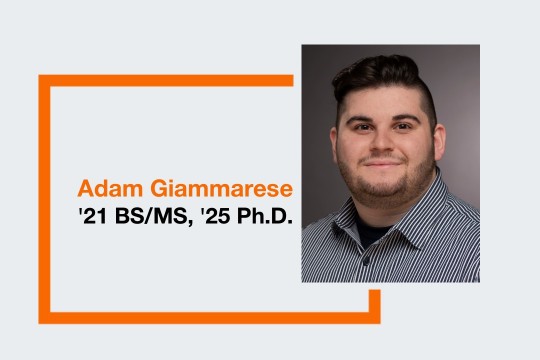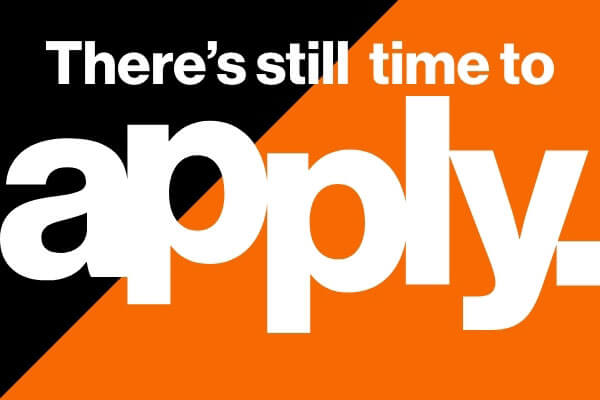Applied Mathematics Bachelor of Science Degree

Applied Mathematics
Bachelor of Science Degree
- RIT /
- Rochester Institute of Technology /
- Academics /
- Applied Mathematics BS
Solve real-world problems in GPS, manufacturing, encryption, and more with RIT’s applied mathematics bachelor’s degree.
Overview for Applied Mathematics BS
Why Study Applied Mathematics at RIT
Career Connections: The Office of Career Services and Cooperative Education hosts a career fair for students to connect with National Labs and federally-funded Research Centers.
Jobs at Industry Leading Companies: Recent applied mathematics graduates employed at Google, Federal Reserve Bank of Cleveland, JP Morgan Chase, and Northrop Grumman Corporation.
Campus Community: Join PiRIT, a student club that fosters a community of students and faculty in mathematics and statistics.
Accelerated Bachelor’s/Master’s Available: Earn both your bachelor’s and your master’s in less time and with a cost savings, giving you a competitive advantage in your field.
STEM-OPT Visa Eligible: The STEM Optional Practical Training (OPT) program allows full-time, on-campus international students on an F-1 student visa to stay and work in the U.S. for up to three years after graduation.
What is Applied Mathematics?
Mathematicians use theory, computational techniques, algorithms, and the latest computer technology to solve economic, scientific, engineering, physics, and business problems. Applied mathematics starts with a practical problem, envisions its separate elements, and then reduces the elements to mathematical variables. Applied mathematicians often use computers to analyze relationships among the variables, and they solve complex problems by developing models with alternative solutions.
RIT’s BS Applied Mathematics
RIT’s applied mathematics bachelor’s degree focuses on the study and solution of problems that can be mathematically analyzed across industrial fields and research disciplines. While studying applied mathematics, you will gain the knowledge and skills to collaborate on complex problems with scientists, engineers, computer specialists, and other analysts. Some areas in which you will practice applied mathematics include:
- Applied statistics
- Biology
- Business
- Economics
- Chemistry
- Electrical, industrial, or mechanical engineering
- Operations research
- Imaging science
Real-World Experiences in Applied Mathematics
In RIT’s applied mathematics bachelor’s degree, you’ll collaborate with a faculty researcher on a variety of projects in both applied and theoretical mathematics providing you with valuable exposure to real-world problems faced by America's top companies and research organizations. As a result, RIT undergraduates in mathematics are highly sought after for co-op positions.
You’ll also have the opportunity to work with researchers in the School of Mathematics and Statistics studying interesting problems in areas such as computational photonics, mathematical biology, microelectromechanical systems, and network analysis.
RIT’s science co-ops include cooperative education and internships, lab work, undergraduate research, and clinical experience in health care settings. These opportunities provide hands-on experience that enables you to apply your scientific, math, and health care knowledge in a professional setting, while you make valuable connections between classwork and real-world applications.
Furthering Your Education in Applied Mathematics
Combined Accelerated Bachelor’s/Master’s Degrees
Today’s careers require advanced degrees grounded in real-world experience. RIT’s Combined Accelerated Bachelor’s/Master’s Degrees enable you to earn both a bachelor’s and a master’s degree in as little as five years of study, all while gaining the valuable hands-on experience that comes from co-ops, internships, research, study abroad, and more.
- Applied Mathematics BS/Applied and Computational Mathematics MS: In this accelerated dual-degree program, you’ll first learn the foundations of mathematical analysis needed to solve the broad spectrum of complex problems that arise in industry and practice. With a strong background established, you’ll dive deep in mathematical models and methodologies with additional computational training during your master’s degree to create sophisticated mathematical tools for use in fields such as data analytics, engineering, biology, manufacturing, financial planning, and more.
- +1 MBA: Students who enroll in a qualifying undergraduate degree have the opportunity to add an MBA to their bachelor’s degree after their first year of study, depending on their program. Learn how the +1 MBA can accelerate your learning and position you for success.
Advanced Degrees in Mathematics
RIT’s School of Mathematics and Statistics introduces applied mathematics bachelor’s degree students to rigorous advanced applied mathematical and statistical methodology as a tool in the study of exciting problems in science, business, and industry. Many undergraduate students choose to continue their education with one of RIT's advanced degrees in mathematics, such as:
-
Join Us for Accepted Student Open House
Visit campus on March 28 or April 11 to meet faculty, tour campus, and ask your questions.
-
Join us for Fall 2026
There's still time to apply. For some programs, applications will be reviewed on a rolling, space-available basis.
Careers and Cooperative Education
Typical Job Titles
| Actuarial Analyst | Data Scientist | Quality Assurance Inspector |
| Software Engineer | Senior Technician | Forecast Analyst |
| Systems Operations Engineer |
Industries
-
Biotech and Life Sciences
-
Defense
-
Government (Local, State, Federal)
-
Insurance
-
Internet and Software
-
Investment Banking
-
Telecommunications
Cooperative Education
What’s different about an RIT education? It’s the career experience you gain by completing cooperative education and internships with top companies in every single industry. You’ll earn more than a degree. You’ll gain real-world career experience that sets you apart. It’s exposure–early and often–to a variety of professional work environments, career paths, and industries.
Co-ops and internships take your knowledge and turn it into know-how. Science co-ops include a range of hands-on experiences, from co-ops and internships and work in labs to undergraduate research and clinical experience in health care settings. These opportunities provide the hands-on experience that enables you to apply your scientific, math, and health care knowledge in professional settings while you make valuable connections between classwork and real-world applications.
Featured Work and Profiles
-
From RIT Math to Predicting Delta Flights: A Career Takes Off
From RIT applied math to Delta Air Lines, Theodore Johnston ’20 forecasts demand, works with the FAA, and uses predictive modeling to keep flights and passengers on track.
Read More about From RIT Math to Predicting Delta Flights: A Career Takes Off -
Equations to Operations: From Math Major to Leadership
Rachele Johnson ’12 transformed her love of applied math into a thriving career in operations, leading a team at Goldman Sachs using knowledge gained from RIT's challenging, hands-on programs.
Read More about Equations to Operations: From Math Major to Leadership -
Explore Undergraduate Research, Discover a Passion, Land a Career
Tyler Godat ’16 chose RIT because of its reputation for undergraduate research, co-ops, and internships. Now, he is an optical measurements engineer at Corning.
Read More about Explore Undergraduate Research, Discover a Passion, Land a Career -
RIT Students Get The Edge They Need With Co-ops
Kylie Pleakis ‘19 chose RIT for the mathematics program and competitive racing. The co-op program was an added bonus that gave her the edge she needed to start her career.
Read More about RIT Students Get The Edge They Need With Co-ops
Curriculum for 2025-2026 for Applied Mathematics BS
Current Students: See Curriculum Requirements
Admissions and Financial Aid
This program is STEM designated when studying on campus and full time.
First-Year Admission
First-year applicants are expected to demonstrate a strong academic background that includes:
- 4 years of English
- 3 years of social studies and/or history
- 4 years of mathematics is required and must include algebra, geometry, algebra 2/trigonometry, and pre-calculus. Calculus is preferred.
- 2-3 years of science is required and must include chemistry or physics; both are recommended.
Transfer Admission
Transfer applicants should meet these minimum degree-specific requirements:
- A minimum of precalculus is required. Calculus is preferred.
- Chemistry or physics is required.
Financial Aid and Scholarships
100% of all incoming first-year and transfer students receive aid.
RIT’s personalized and comprehensive financial aid program includes scholarships, grants, loans, and campus employment programs. When all these are put to work, your actual cost may be much lower than the published estimated cost of attendance.
Learn more about financial aid and scholarships
Accreditation
Research
Undergraduate Research Opportunities
Many students join research teams and engage in research projects starting as early as their first year. Participation in applied mathematics research leads to the development of real-world skills, enhanced problem-solving techniques, and broader career opportunities. Our students have opportunities to travel to national conferences for presentations and also become contributing authors on peer-reviewed manuscripts. Explore the variety of mathematics and statistics undergraduate research projects happening across the university.
Related News
-
February 10, 2026

Researchers develop new method for predicting chaos
Mathematician Edward Lorenz used the butterfly effect to explain chaos theory in the 1960s. Now, decades later, a team from RIT has developed a method to predict chaos using less data, fewer parameters, and a more user-friendly format.
-
January 30, 2026

Mathematical modeling alumnus wins early career award
RIT alumnus Adam Giammarese’s work in chaos theory has earned him the Edward N. Lorenz Early Career Award, an annual recognition by the publication Chaos: An Interdisciplinary Journal of Nonlinear Science.
-
June 26, 2024

Student completes project with international company through RIT’s global connections
Reagan Brenneman ’24 (applied mathematics) had the opportunity to combine her multiple areas of study into an international experience working for the company Saponia in Croatia.
Contact
- Nathaniel Barlow
- Associate Professor, Applied Mathematics
- School of Mathematics and Statistics
- College of Science
- 585‑475‑4077
- nsbsma@rit.edu
School of Mathematics and Statistics




















